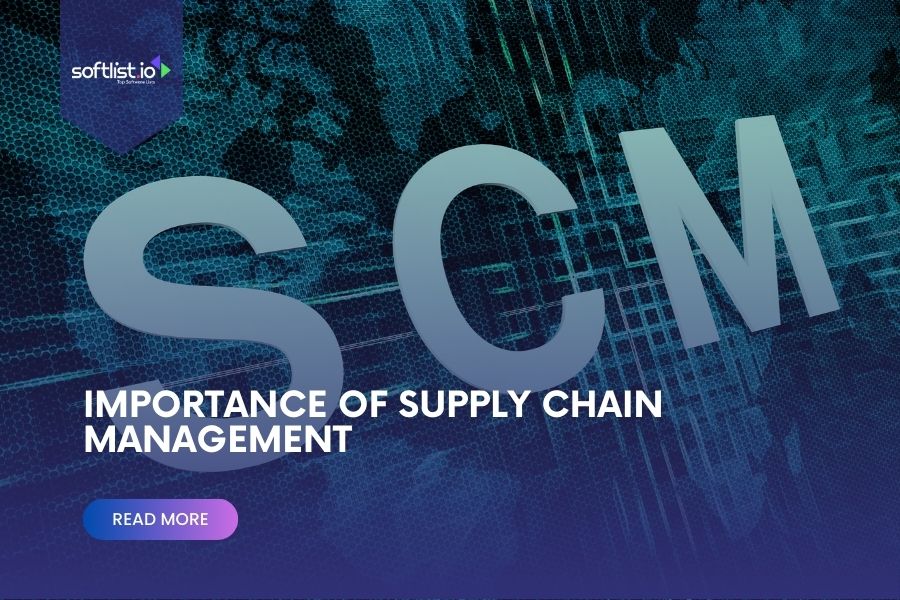Supply chain management (SCM) is very important for modern businesses, especially when it comes to making customers happier.
Effective supply chain management is necessary because it controls the flow of goods and services from where the raw materials come from to where the finished product is delivered to customers.
This article talks about the importance of supply chain management and the different ways that businesses can use it to improve their operations, cut costs, and make customers satisfied in the end.
Why Is Supply Chain Management Important for Today’s Businesses?
Source: Canva Pro
Understanding the Basics of Supply Chain Management
Supply chain management encompasses the planning and management of all activities involved in sourcing, procurement, conversion, and logistics management. It also includes the crucial components of coordination and collaboration with channel partners.
SCM’s ultimate goal is to reduce inventory, increase the speed of transactions with suppliers and customers, and enhance the efficiency of supply chains.
Supply chain management is very important for businesses because global supply lines are so common in today’s world.
The Strategic Role of SCM in Business Success
The strategic role of SCM in business success cannot be understated. Effective supply chain management allows companies to streamline their production process, ensuring that goods and services are delivered efficiently to meet customer demand.
This not only supports operational efficiencies but also drives competitive advantage. The ability to manage supply chains effectively means that companies can anticipate supply and demand, manage relationships with suppliers and distributors, and mitigate any potential disruptions to their operations, securing their position in the competitive market.
How SCM Contributes to Competitive Advantage
SCM contributes to a significant competitive advantage by optimizing the flow of products and information throughout the supply chain, ensuring that customer demands are met promptly and efficiently.
By reducing supply chain costs and improving inventory management, businesses can offer more competitive pricing and better product availability.
Furthermore, strong supplier and distributor relationships ensure that companies can react quickly to changes in the market, including shifts in supply and demand, technological advances, or disruptions such as the COVID-19 pandemic.
Exploring the Benefits of Effective Supply Chain Management
Source: Canva Pro
Streamlining Operations and Reducing Costs
One of the primary benefits of effective supply chain management is the ability to streamline operations and reduce costs. By optimizing supply chain processes, businesses can eliminate inefficiencies, reduce excess inventory, and minimize costs associated with storage and logistics.
Streamlining these processes enables companies to allocate resources more effectively, enhancing their ability to deliver products and services at competitive prices.
Improving Inventory Management
Improving inventory management is another critical advantage of SCM. Effective supply chain management ensures that inventory levels are kept at optimal levels to meet demand without leading to excess.
This is achieved through accurate forecasting, improved supplier relationships, and advanced logistics practices, helping businesses avoid shortages or surpluses and reducing the overall cost of inventory management.
Enhancing Supplier and Distributor Relationships
SCM plays a pivotal role in enhancing relationships with suppliers and distributors. Strong partnerships throughout the supply chain can lead to improved communication, reliability, and efficiency, contributing to smoother supply chain operations.
By fostering good relationships, companies can secure better terms, gain access to new products and technologies faster, and ensure the timely delivery of goods, thereby directly benefiting the end customer.
How Can SCM Software Transform Your Business Operations?
Source: Canva Pro
Key Features of Supply Chain Management Software
Supply chain management software offers a plethora of features designed to automate and improve various aspects of the supply chain process.
These include inventory management, supplier management, demand forecasting, and logistics optimization, among others. By leveraging SCM software, businesses can gain real-time insights into their supply chains, enabling them to make data-driven decisions that enhance efficiency and profitability.
Integrating SCM Software with Your Existing Systems
Integrating SCM software with existing systems is crucial for maximizing its benefits. This integration allows for seamless data flow between different business operations, resulting in improved accuracy and speed in decision-making.
Supply chain professionals need to ensure that SCM software is compatible with their current infrastructure and that employees are adequately trained to leverage the new system effectively.
The ROI of Investing in SCM Technology
The return on investment (ROI) from investing in SCM technology can be substantial. By automating supply chain processes and providing actionable insights, SCM software can significantly reduce operational costs, improve efficiency, and enhance customer satisfaction.
These improvements directly contribute to a stronger bottom line and justify the investment in technology upgrades.
Adapting Supply Chain Management Strategies in the Wake of COVID-19
Source: Canva Pro
Lessons Learned from Pandemic-Induced Supply Chain Disruptions
The COVID-19 pandemic has underscored the vulnerability of global supply chains to major disruptions. Many businesses experienced firsthand the consequences of not having resilient supply chains—ranging from shortages of raw materials to complete halts in production.
The lessons learned from these challenges highlight the importance of flexibility, diversification of suppliers, and the need for robust supply chain planning to mitigate future risks.
Building Resilience into Your Supply Chain
Building resilience in supply chains involves creating systems that can absorb shocks and continue to function even under adverse conditions.
This requires a thorough assessment of potential risks, investing in supply chain visibility, and developing strategic partnerships with suppliers and distributors. Fostering a resilient supply chain ensures that businesses can maintain operations and satisfy customer demand even when unexpected disruptions occur.
Flexibility and Adaptability: New Priorities for SCM Post-COVID-19
In the aftermath of the pandemic, flexibility and adaptability have emerged as critical priorities for supply chain management. Businesses must be prepared to adjust their supply chain strategies quickly in response to changing market conditions.
This includes the ability to switch suppliers, alter production schedules, and utilize alternative distribution methods to ensure the continuous flow of goods and services. Embracing flexibility and adaptability in supply chain strategies is key to thriving in the post-COVID-19 world.
Best Practices for Optimizing Your Supply Chain Management Process
Collaboration Across the Supply Chain for Greater Efficiency
Collaboration is essential for achieving greater efficiency across the supply chain. By working closely with suppliers, manufacturers, and distributors, companies can ensure that information is shared effectively, improving the planning and execution of supply chain activities.
Effective collaboration leads to a more responsive and agile supply chain, capable of meeting customer needs more efficiently.
Using Data Analytics for Improved Forecasting and Inventory Management
Utilizing data analytics can significantly improve forecasting and inventory management within the supply chain. Advanced analytics tools allow businesses to analyze vast amounts of data to identify patterns and predict future demand more accurately.
This not only improves inventory management but also helps businesses optimize their supply chain operations and respond swiftly to market changes.
The Importance of Continuous Improvement in SCM
Continuous improvement is vital in the realm of supply chain management. Businesses should continually assess and refine their supply chain processes to identify areas for improvement.
This may involve adopting new technologies, revising supplier agreements, or implementing more efficient logistics strategies. Embracing a culture of continuous improvement empowers businesses to stay competitive and meet the evolving needs of their customers.
Final Thoughts
Supply chain management is an important part of running a business today. Costs go down, processes get easier, and inventory control gets better when SCM works well. All of these things make customers happier.
Businesses can be sure that their products will be delivered on time and reliably by building strong relationships with their suppliers and distributors.
When SCM software is added to these processes, it makes them even better by giving real-time information and automating tasks that make them more efficient. During the COVID-19 pandemic, it became clear how important it is to have supply lines that are strong and flexible so they can handle sudden problems.
Companies can stay ahead of the competition and meet their customers’ changing needs by emphasizing being flexible, working together, and always getting better. These strategies will help you be successful and stable in the long run in a global market that is getting more complicated.
Feel free to dive into the world of Internet marketing. You can get detailed tips on how to use different digital marketing tools and methods to improve your brand’s visibility and return on investment (ROI) by visiting our website. No matter how experienced you are, our tools will help you.
FAQs
Why is supply chain management important?
Supply chain management is important because it ensures that products or services are delivered efficiently from suppliers to customers. It helps supply chain managers improve customer satisfaction by optimizing the flow of goods through the distribution center.
What are the five benefits of supply chain management?
- Efficiency: Managing the supply chain reduces operational costs.
- Customer Satisfaction: A good supply chain improves customer service.
- Flexibility: Supply chain management allows quick responses to market changes.
- Quality Control: It enhances the quality of products or services.
- Competitive Advantage: A total supply chain strategy can give a business an edge over competitors.
What is the main point of supply chain management?
The main point of supply chain management is to streamline and optimize the flow of products or services from the initial supplier to the end customer, ensuring efficiency and customer satisfaction.
Why is supply chain management important in a project?
Supply chain management is important in a project because it helps supply chain managers make informed decisions, ensuring timely delivery and resource quality, and improving overall project success.
What is the ultimate objective of supply chain management?
The ultimate objective of supply chain management is to enhance supply chain performance by coordinating all participants in the supply chain to deliver products or services efficiently and cost-effectively.







